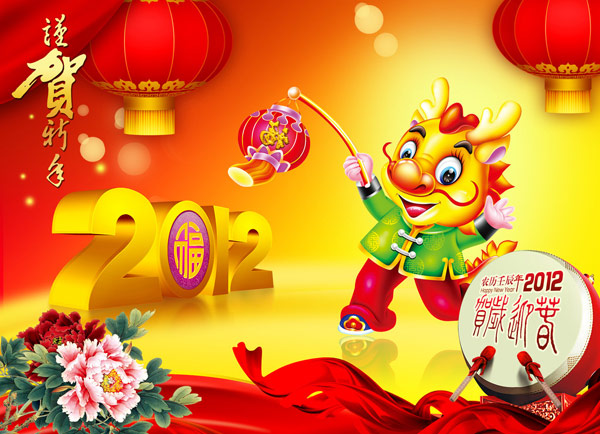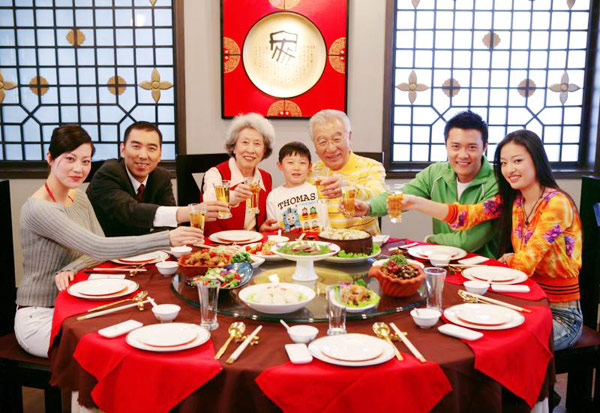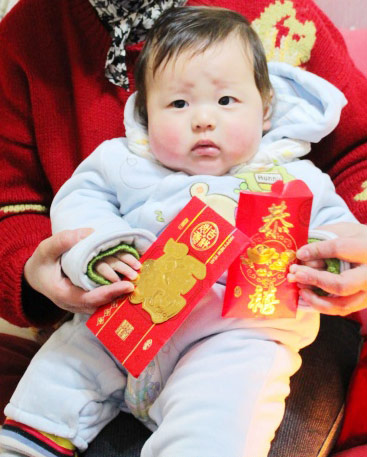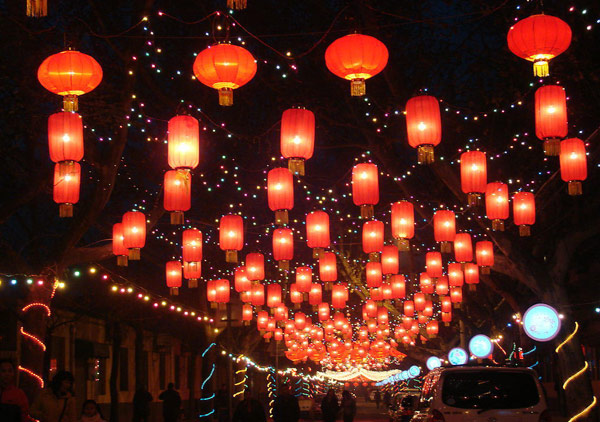Chinese New Year, also called ‘Spring Festival‘ in China, is the longest and most important one of Chinese traditional festivals.
It begins on the first day of the first lunar month, and ends with
Lantern Festival on the 15th day. For Chinese people, it is a time for
family reunion, just like the Christmas in the West.
Actually, preparation for Spring Festival starts a month or days
earlier. Chinese people buy presents, decoration materials, food and
clothing for the coming celebration. Also, they would give their home a
thorough cleaning. It is believed the cleaning sweeps away bad luck and
makes their homes ready for good luck to arrive. After that, the doors
and windows are decorated with paper cuts and couplets with Chinese auspicious phrases.
Chinese New Year’s Eve, known as “Chu Xi” or “Eve of the Passing Year”, is a a day when Chinese families gather for their annual reunion dinner. A dish consisting of fish will appear on the tables of Chinese families. It symbolizes surplus or success. After dinner, many families in mainland China will banter whilst watching the CCTV New Year’s Gala in the hours before midnight. They would hold a countdown to the new year, then the 15-day celebration comes.
The First Day of Chinese New Year
The first thing of that day is to welcome the Gods of the heaven and earth, which officially begins at midnight. It tells the arrival of Chinese New Year. After getting up in the morning, people typically wear new clothes from head to toe to symbolize a new beginning in the new year. Most importantly, it is a time to honor one’s elders, usually their parents, grandparents and great-grandparents. Red envelop, a monetary gift for the new year, are typically given by the married to the unmarried, most of whom are children.
The Second Day
Traditionally, married woman will visit and pay respect to their birth parents with her husband on this day.
The Third Day
Though the first week of Chinese New Year is the most important and most celebrated with visits to friends and family. But it is generally accepted that the third day is not a good time to socialize or visit your relatives and friends.
The Fourth Day
This is an auspicious day to re-open the businesses after the main New Year holidays.
The Fifth Day
The day is regarded as the birthday of the God of Wealth. People stay home to welcome the God of Wealth into their homes. In some pleaces, people also re-open their businesses; and shoot off firecrackers in the attempt to get the attention of the God of Wealth, for a good fortune of the new year.
The Sixth Day
It marks the time to visit relatives and friends, plus temples for good fortunate & health.
The Seventh Day
The seventh day, traditionally known as Renri (the common man’s birthday), is the day when everyone grows one year older. Noodles are eaten to promote longevity.
The Eighth Day
Another family dinner is held to celebrate the eve of the birth of the Jade Emperor. However, everybody should be back to work by the eighth day.
The Ninth Day of the Chinese New Year
It is a day for Chinese to offer prayers to the Jade Emperor of Heaven to ensure a good year to come.
The Tenth through Twelfth Day
In these days, friends and family are invited for dinners.
The Thirteenth Day
On the 13th day people will eat pure vegetarian food to clean out their stomach due to consuming too much food over the last two weeks.
The Forteenth Day
Preparations will be made for the Lantern Festival.
The Fifteenth Day
The tradition of Lantern Festival
(also called “Yuanxiao Festival” or “Shang Yuan Festival”) on the fifth
day has been part of Chinese New Year celebration for more than 2,200
years. Tangyuan or Rice dumplings, a sweet glutinous rice ball brewed in
a soup, are eaten this day. At night, children go out to temples
carrying paper lanterns and solve riddles on the lanterns. The day
brings the 15-day celebration of Spring Festival to an end.
 |
| Year of the Dragon 2012, Chinese Lunar New Year |
Chinese New Year’s Eve, known as “Chu Xi” or “Eve of the Passing Year”, is a a day when Chinese families gather for their annual reunion dinner. A dish consisting of fish will appear on the tables of Chinese families. It symbolizes surplus or success. After dinner, many families in mainland China will banter whilst watching the CCTV New Year’s Gala in the hours before midnight. They would hold a countdown to the new year, then the 15-day celebration comes.
 |
| Reunion Dinner on New Year's Eve, Chinese Spring Festival |
The first thing of that day is to welcome the Gods of the heaven and earth, which officially begins at midnight. It tells the arrival of Chinese New Year. After getting up in the morning, people typically wear new clothes from head to toe to symbolize a new beginning in the new year. Most importantly, it is a time to honor one’s elders, usually their parents, grandparents and great-grandparents. Red envelop, a monetary gift for the new year, are typically given by the married to the unmarried, most of whom are children.
 |
| Red envelope - a monetary gift for the new year |
Traditionally, married woman will visit and pay respect to their birth parents with her husband on this day.
The Third Day
Though the first week of Chinese New Year is the most important and most celebrated with visits to friends and family. But it is generally accepted that the third day is not a good time to socialize or visit your relatives and friends.
The Fourth Day
This is an auspicious day to re-open the businesses after the main New Year holidays.
The Fifth Day
The day is regarded as the birthday of the God of Wealth. People stay home to welcome the God of Wealth into their homes. In some pleaces, people also re-open their businesses; and shoot off firecrackers in the attempt to get the attention of the God of Wealth, for a good fortune of the new year.
 |
| God of Wealth, Chinese Culture |
It marks the time to visit relatives and friends, plus temples for good fortunate & health.
The Seventh Day
The seventh day, traditionally known as Renri (the common man’s birthday), is the day when everyone grows one year older. Noodles are eaten to promote longevity.
The Eighth Day
Another family dinner is held to celebrate the eve of the birth of the Jade Emperor. However, everybody should be back to work by the eighth day.
The Ninth Day of the Chinese New Year
It is a day for Chinese to offer prayers to the Jade Emperor of Heaven to ensure a good year to come.
The Tenth through Twelfth Day
In these days, friends and family are invited for dinners.
The Thirteenth Day
On the 13th day people will eat pure vegetarian food to clean out their stomach due to consuming too much food over the last two weeks.
The Forteenth Day
Preparations will be made for the Lantern Festival.
The Fifteenth Day
 |
| Beautiful lighted lanterns at night, Lantern Festival |
No comments:
Post a Comment